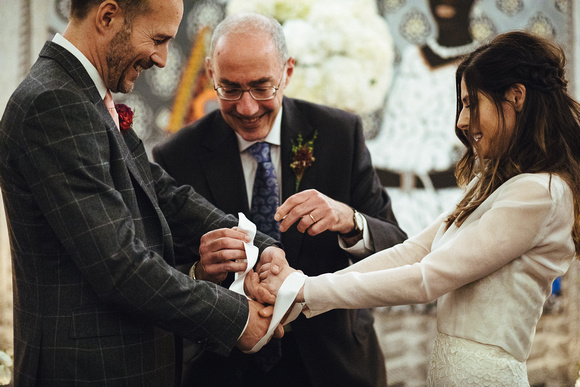
by Michael | Jul 1, 2019 | Blog
People often
ask me how I became a celebrant.
The truth is that I had never heard of the term “civil celebrant”. In 2012 I was plying a different trade (fairly unsuccessfully!), and turned up at a business networking event. I noticed a man on his own, so I approached and asked him what he did. David explained that he created and conducted civil ceremonies for people.
Not necessarily religion
The only life-cycle ceremonies I had experienced thus far had been attending full religious ones. Some were Jewish – of various types – some Christian, one Hindu. I had enjoyed some more than others. They had always been conducted by an ordained minister following a standard order of service.
David told me that it was he who created a bespoke order of service. He would meet and then work together with the family to give them ideas and guidance so that he could draw up a draft service.
There was no reason why he couldn’t put in religious elements, part-religious ones or keep it strictly secular. It all depended on the client. Every one of the elements would be discussed with and agreed by the client.
This began
to make sense to me. After all, why shouldn’t you have the ceremony that you
want for your big day?
There would then be an exchange of e-mails and the client would end up with exactly the ceremony of his/her dreams, having approved every word. Then it would be down to David’s presentation skills on the day.
Why me?
I loved the concept. I also knew that I had the skills needed. I am a good listener and have learned the sort of questions I need to ask; I can write well; and, although I am basically shy, I am very happy to stand up in front of a crowd and deliver a memorable service. (I’ve never quite understood that!)
Next steps
Anyway, I was smitten. I rang David a night or two later with a few more questions, and knew this was for me. So, to training.
David pointed me in the right direction, and I wasted no time. While I was training as a Wedding Celebrant, it was pointed out that I possessed the qualities for a funeral celebrant. (Not sure how much of a compliment that might be!) Anyway, that was my next course of study.
And then, duly certified, I was let out into the wide world!
I have thoroughly enjoyed my years to date as a celebrant. I have enabled couples to have the ceremony of their dreams – and that includes conducting funerals that are “just right”. No two ceremonies have ever been the same. Sometimes, I have had to work under quite severe pressure, and not everything has always gone to plan. However, I have had a marvellous, fulfilling, rewarding time so far, and expect to continue doing so for a few years to come.
I certainly have no regrets about becoming a civil celebrant!
Photo: www.lyndseygoddard.com
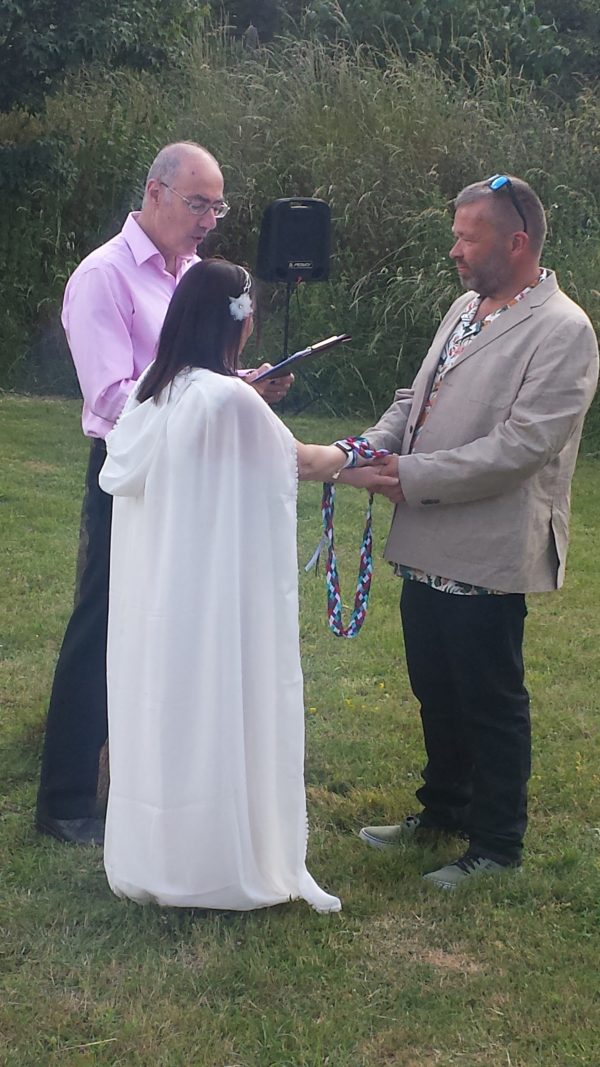
by Michael | Nov 5, 2018 | Blog
Mixed-faith ceremonies were virtually unthinkable a dozen years ago. Fortunately, we’ve moved on. They are much more accepted (and desired) nowadays.
Of course, there is a need. If a couple want to marry religiously, they may be prevented from so doing because of their church’s rules. So a Catholic divorcee will not be able to marry in Church. Same-sex ceremonies are still not accepted by many churches. Mixed-faith couples have the same problem, although some more enlightened institutions may be willing at least to bless the pair.
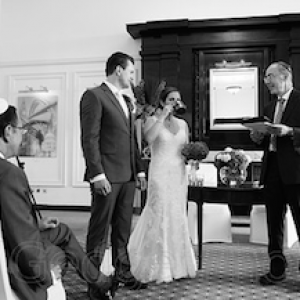 Photo: Philippa Gedge Photography
Photo: Philippa Gedge Photography
Not every mixed-faith couple wants any religion, and the Register Office may fill a gap. (Obviously, all marriages need to be registered officially in this country.) However, Register Office ceremonies are fairly standard and sometimes reek of the conveyor-belt.
An alternative can be a ceremony compiled and led by a civil celebrant (possibly, but not necessarily, a humanist). The celebrant can create a spiritual, beautiful ceremony – but such a ceremony does not have legal validity.
The Registrars’ service will be totally secular. There may be absolutely no religious mentions or readings, which may not meet the needs of the couple (or their families).
A civil celebrant will be able to meet the pair’s needs, if they want a part-religious ceremony. The celebrant may not be ordained, but can still include religious elements (usually agreed with the couple).
In fact, the civil celebrant will work with the couple to design the service that fits in with their beliefs. So it may be religious, part-religious or totally secular. It may contain rituals from a variety of religions and/or cultures.
The service will also be exactly as the couple want. It is up to them what clothes will – or will not – be worn (I have received special requests about my garb – but not, as yet, to wear a football shirt!). The couple can choose readings or poems, and also readers. There can be an address by the celebrant – checked in advance by the couple. They can have elements that they want, including the music, in the order that they want. (The celebrant may well offer advice.) They may choose to deliver their own vows. In short, absolutely everything can be approved by the couple before the day.
Logistically, there are a couple of decisions to be made.
- Should the register office ceremony take place a few hours – or a day or two – in advance? That way, the legal bit is covered by the time the couple come to the ‘real’ wedding ceremony, and they can relax and really enjoy their bespoke ceremony.
- Should the civil ceremony or blessing come straight after the legal marriage (at the same venue)? The ring blessing, for example, could be done by the civil celebrant, as could the vows. This way, the registrars could conduct a 10-15 minute ceremony, and the blessing ceremony could take around as long (depending), but cover the couple’s wishes.
The important thing on such a big day is to deliver a memorable, meaningful ceremony – one which the couple and their guests will remember fondly for months and years to come. By creating a personalised service and conducting it professionally, a good civil celebrant will ensure this.
Please ask Michael for more information.
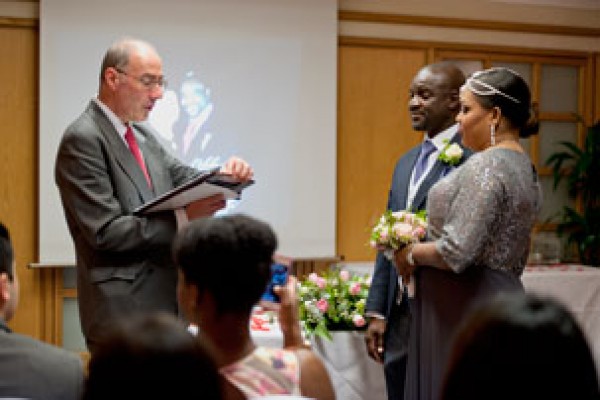
by Michael | Jun 18, 2018 | Blog
OK, I’m think Vow Renewals are a delight. But why, actually, should anyone even consider renewing their vows?
Well, I’m a civil celebrant, so I have to conduct them and happen to love them. However, that response may not help you if you’re seeking justification!
I therefore suggest these (hopefully, more compelling!) reasons.
Why renew vows?
34% of marriages end in divorce and 33% of them end before 10 years, so there’s every reason to celebrate staying together. People often look at 10, 15, or other multiples of 5 years as good times to celebrate.
You don’t need to renew your marriage just because there’s a five or zero at the end of your anniversary. Renewing your vows can mark significant moments in your lives. These could be the birth of a baby, or coming out the other side of a difficult marital patch or illness. Maybe family and friends missed the original wedding because it took place abroad.
What is a Vow Renewal ceremony?
Of course, the ceremony is a public declaration of love between two people. It can be in front of 200 people, or it can be a tiny, informal affair for just a handful of guests. The venue can be virtually anywhere and you have total control over how big – or small – any reception may be.
The Vow Renewal ceremonies I conduct tend to be modest, but very beautiful. There may be religious content or not, or a mixture. When putting the ceremony together, I suggest readings and poems (and, where required, prayers) that are spiritual, meaningful and memorable. All are subject to the clients’ wishes.
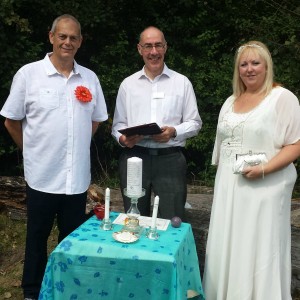
Vows
A focal point is usually the vows themselves. These can be written by the couple, and are often very moving. I always offer guidance on writing these, as many people find the prospect daunting. If they prefer it, I can suggest vows for them.
Quite often, people want their rings blessed, which is another moving part of the ceremony.
Check list
You’ll need to consider the following when planning your Vow Renewal:
- Venue: you don’t need to be restricted (except by budget and legality!). So you can have the ceremony in your garden, at the top of the London Eye, in a luxurious hotel, in a park or on a bridge. Or maybe at the place where you originally tied the knot.
- Invitations: you can invite whoever you want to participate in the ceremony. Maybe you have children – why not ask them to take part? The size of the guest-list is entirely down to you.
- Dress: again, up to you (although make sure you communicate your preferences to your celebrant and guests, to avoid potential embarrassment!)
- Music: you may want to use the music that you heard at your wedding; you may want a relative (preferably with a great voice!) to do a solo; you may want to play a tune that means something very special to you both; you may want nothing – again, the choice is all yours.
- Photographer: you’ll want to capture the moment for posterity, so give some thought to hiring a good photographer (see my dedicated blog )
- Catering: even if you’re having a modest ceremony, some champagne (or equivalent) and a snack go will down well afterwards.
- Other possibilities, like a reception, may be taken into consideration too.
The Beauty of Freedom
The joy of renewing your vows is that you have such freedom to arrange the ceremony as you want. You can tell the world that you love your spouse and your spouse loves you. You don’t have to wait fifty years – you can do it when you’re ready. You can spend as much or as little as you want. You can involve whoever you want. It’s such a happy event.
I hope I’ve managed to convince you!
I would love to help you. Just phone or e-mail me.
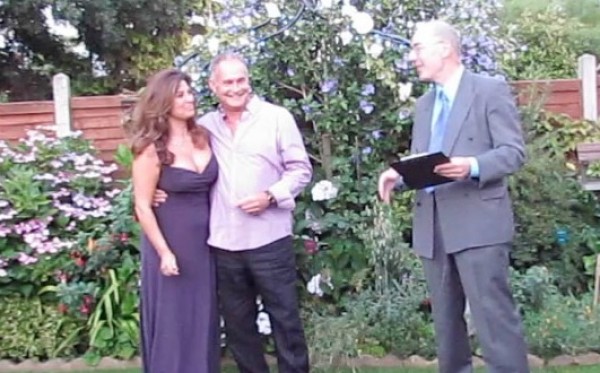
by Michael | Jun 4, 2018 | Blog
A wedding planner can be wonderful! At the very least, she should ensure peace of mind for you. Let her take care of all the arrangements. She will look after you in the run-up to, and of course on, your big day.
Of course, not unreasonably, there’s a cost involved.
If, however, you prefer not to go down that route, here are a few tips to bear in mind.
If you want the full church service, then of course your priest will be able to give you all the advice you need. Note that the service will be prescribed, rather than personal.
A register office ceremony may well be brief, but will be standardised and not really personal either.
For a unique ceremony reflecting your personalities and which can be tailor-made, work with a professional civil celebrant.
Starting the Process
Whatever you do, in addition to reserving your venue, you will need to formally give notice (together and in person) of marriage/civil partnership and book the registrars.
Registrars
Option One
An excellent plan, if you are having a civil ceremony, and wish to choose a venue that is not actually licensed for weddings, is to go down to the Register Office (make an appointment first!) with two witnesses the morning or day(s) before. You can wear your ordinary clothes. Ten or so minutes later, you become legally married.
You can enjoy exactly the ceremony you want afterwards (free of anxiety). Why not finish with a certificate-signing (not legally binding) for that photo-opportunity for your guests?
Option Two
However, if you are marrying in licensed premises, registrars will still need to be present (and, therefore, pre-booked). (You can have your bespoke ceremony straight afterwards.)
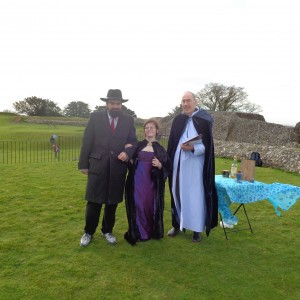
Venue
It is up to you whether you choose a licensed venue or, for example, the great outdoors, as long as you bear the above paragraphs in mind. If you are planning to use private land, ensure you ask permission first!
Preliminaries
It is beyond the scope of this article to go into each element in depth, but, depending on the scale of your ceremony, some of the things you will need to consider – in good time – are:
- Dress
- Catering
- Guest list
- Invitations
- Flowers
- Seating plan
- Transport
- Order of service booklet
- Entertainment
- Potential accommodation for you and/or guests
- Officiant
And, not least, the content of the wedding service itself.
The Wedding Ceremony
Do you want the traditional bits? Or just some of them? Do you prefer a modern service? Do you want hymns? What music do you want? Who will participate (eg as reader(s))? Who should walk down the aisle? What about including some less orthodox rituals (handfasting, Unity candles, etc.)?
A lot of questions! But these are all things that the civil celebrant should be able to advise you on. They will construct the ceremony with you and you will approve every bit of it along the way, so that you (and, your guests) will enjoy a unique, personalised, tailor-made ceremony.
Like the sound of that? Given time, you can organise all this yourself quite successfully, save money, and still have the memorable, delightful ceremony of your dreams.
Even without a wedding planner.
But I do suggest using a civil celebrant!
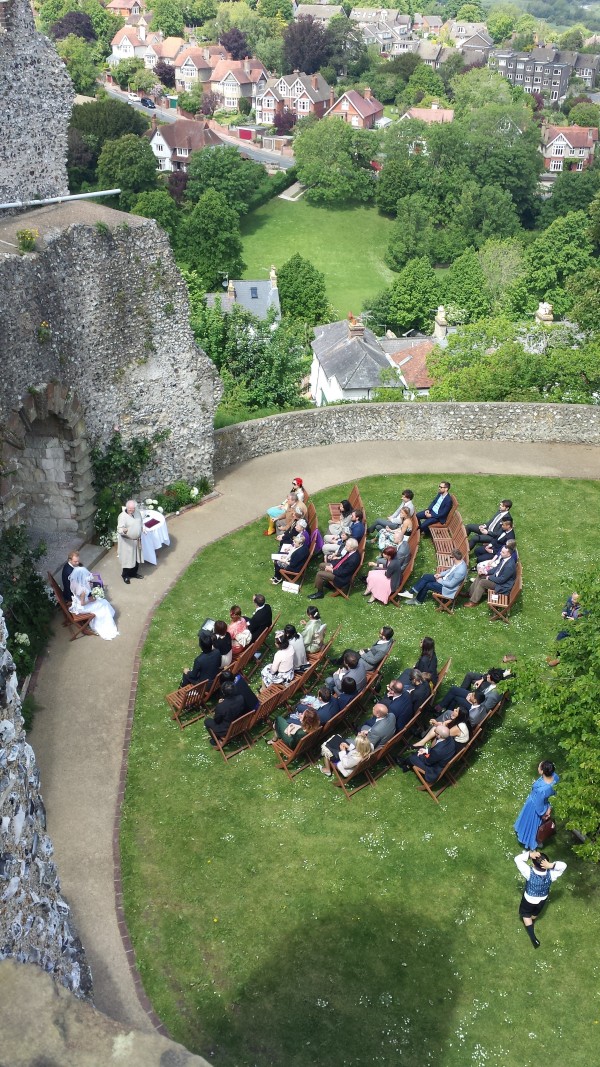
by Michael | Jan 16, 2018 | Blog
Just imagine for a moment …
What if a full religious wedding doesn’t rock your boat?
What if the secular, standard, certificate-signing at a Register Office doesn’t excite you either?
But what if you could go to the Register Office in the morning or the day before in your jeans, with a couple of witnesses?What if you signed the marriage certificate and then enjoyed a wonderful, joyous ceremony in the afternoon with all your guests?
Because you can.
With the help of a celebrant.
As long as the legal bit is still carried out, there’s nothing to stop you holding the ceremony you actually want – at the venue you want.
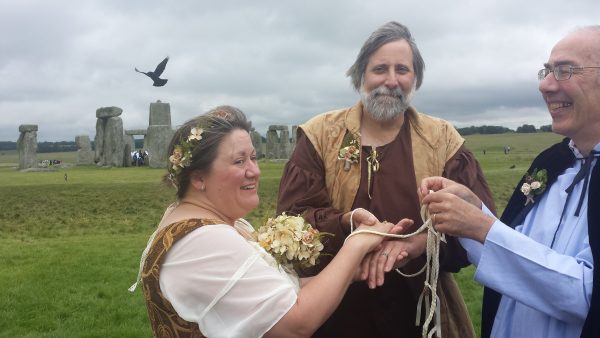
The Ceremony
One of the beauties about a celebrant-led wedding is that he or she will help you (as much or as little as you want!) to build your own ceremony. So if you want a religious component (even taken from various cultural sources), or a mixture, you can put it in; if you want spiritual elements, just go for it; poems and texts are absolutely OK. With some give and take, this way you can please yourselves AND keep your parents happy!
As well as the readings, you decide on the music. You also have the last word on the choreography (who walks or stands where), readers, the wording, and delivery, of the vows. Don’t worry, if that sounds off-putting. Your celebrant will be pleased to advise and make helpful suggestions. This process, usually conducted by e-mail, can go on over the course of several months.
Ritual
You will be able to incorporate any rituals and little touches that would not previously have been possible, if you so wish. For example, drink from a loving cup, burn a Unity Candle or have a handfasting (an ancient Celtic betrothal ritual).
Conclusion
In short, this is YOUR day, and your celebrant, who will of course conduct the ceremony for you, will do everything to ensure that the day is unforgettable, meaningful and what YOU want.
You only have to imagine (and get in touch!)!









